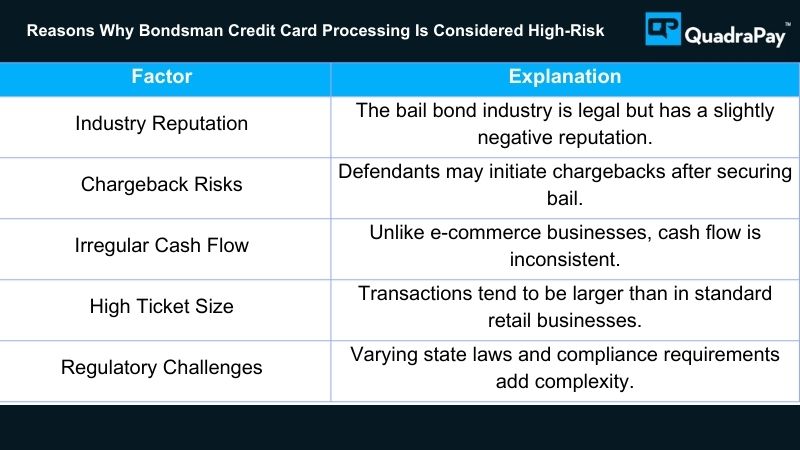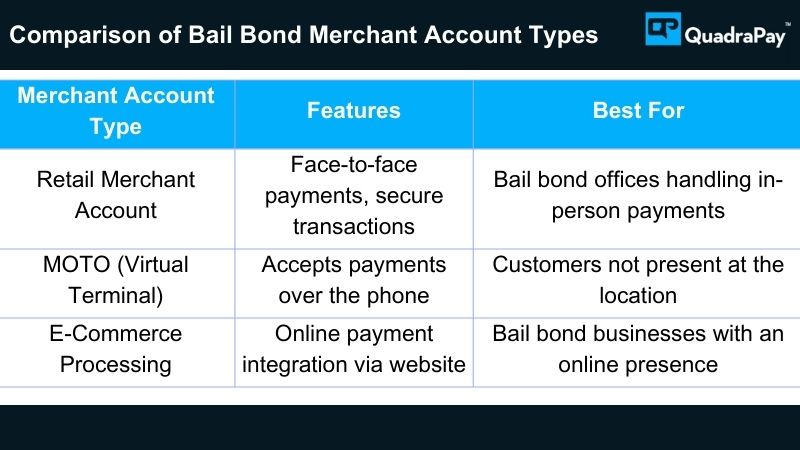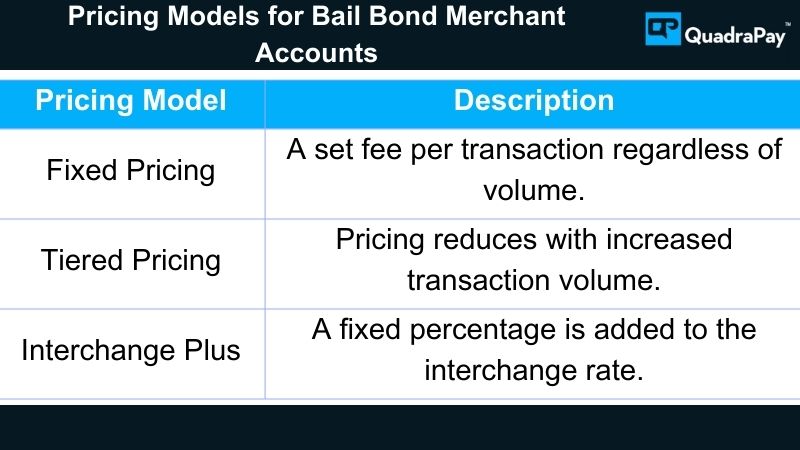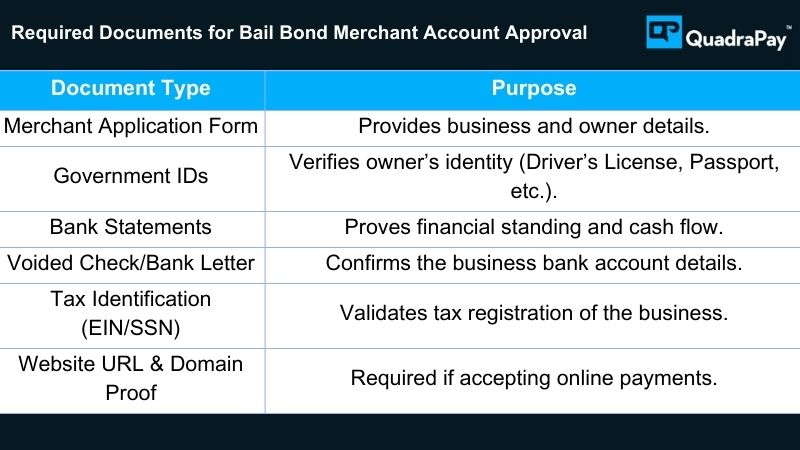Better Bail Bond Merchant Account: Low-Cost Bondsman Credit Card Processing
A bail bond merchant account is a specialized bank account for bondsman businesses. With this merchant account, bail bond businesses can accept credit and debit card payments for defendants’ bail.
A good bondsman merchant account will offer you a competitive advantage over other bondsman companies that still use traditional checks, bank transfers, and cash as payment methods. A credit card processing company with years of experience in the bail bond payment processing industry should be your number one choice. Generic payment processors don’t like working with bondsman businesses. This is because traditional sponsor banks consider bondsman business as high-risk and prefer to stay away.
Why Is Bondsman Credit Card Processing High-Risk?
Bondsman merchant processing is high risk for several reasons. Although the industry is 100% legal, it has a slightly negative reputation. The media frequently portrays bail bonds as being inherently risky, which contributes to this perception.

Additionally, the possibility of high chargebacks and returns poses another concern for banks. Defendants may initiate chargebacks or disputes after obtaining bail, adding to the risk factor.
Unlike typical e-commerce industries, the bail bondsman sector lacks regular cash flow. It typically involves higher average ticket sizes, further increasing the credit risk of acquiring banks.
The uncertainty of defendants appearing in court after obtaining bail presents regulatory challenges. Various government regulations may apply depending on the state where the bail bond company is registered and where the defendant resides.
Therefore, it’s crucial to partner with a high-risk bail merchant account provider that has the expertise to effectively manage the associated risks.
High-risk credit card processing made easy
Types of Bail Bond Merchant Accounts
We offer various types of Bondsman merchant processing accounts, with the most popular options including retail bail bond credit card terminals, over-the-phone (MOTO) accounts, and e-commerce bail bond processing accounts. Let’s explore each of these.

Retail Merchant Account: This allows you to accept face-to-face payments, typically at the bail bond office, where the families or friends of the defendant visit to process the bail bond request. Our credit card processing terminals can be easily set up at your preferred bail bond point-of-sale system. Accepting face-to-face payments for bail bond business is considered one of the most secure ways of collecting payments.
Virtual Terminal or MOTO Merchant Account: With this type of account, you can accept credit card information over the phone and submit it to the virtual terminal. This kind of bail bond merchant account can be highly beneficial for collecting payments from clients who are not physically present at your bail bond office.
E-Commerce Credit Card Processing: This option is for the bail bond business is another popular option. This allows you to integrate the payment gateway into your website. Clients can easily navigate to your website and make payments securely.
Features of Bondsman Credit Card Processing
Some of the best acquiring institutions in America power our credit card processing solutions for bail bond merchants, ensuring that you receive top-notch features and benefits. Some of the key benefits are listed below:
No Application Fees: We do not charge any application fee when you submit a request on our website for a bail bond merchant account, reducing the risk of spending money without approval.
Competitive Rates: We present offers from well-known payment processors and acquiring banks at highly competitive pricing, often lower than many other providers. These competitive rates help you increase your profits.
Easy Integration: Our credit card processing solutions integrate easily with your conventional point-of-sale system, website, and mobile application.
Advanced Merchant Center: Gain access to detailed reporting through our advanced merchant center. Easily track all transactions, refunds, and chargebacks with visual representations on the merchant account panel.
Rates for Bondsman Merchant Accounts
The merchant processing rates for bail bond businesses can vary depending on multiple factors. Businesses with a solid financial standing and experience in processing credit card payments can often get better rates than those just starting up.
General factors that can significantly impact the pricing structure of bail bond merchant services include the history of payment processing, the financial standing of the company, the credit rating of the directors, the types of services being offered, and the types of card brands accepted. At QuadraPay, our partners offer three different types of pricing models.

Fixed Pricing Model: A predetermined fee is applied to every transaction on your website.
Tiered Pricing Model: Your pricing is reduced based on the volume commitment you achieve.
Interchange Plus Model: You pay a fixed percentage over the interchange rate.
While these may sound confusing, you don’t need to worry. When you contact us, we can explain how these pricing models differ and help you choose the best one for your business.
Application Approval Process for Bail Bond Merchant Account
With QuadraPay, applying for a bail bond merchant account is straightforward. Start with a basic pre-application by providing your name, email, phone number, and requirements. We will then initiate a free consultation to better understand your needs.
Based on your requirements, we will start matching the best payment service providers for you. We will then connect you with our acquiring partners, and they will initiate the underwriting review.
Throughout the process, we will keep you posted about all the developments. Sometimes the payment processing company may ask for additional documents. If so, then we will let you know.
If everything goes well, you will get the approval email with the term sheet. Next, you will need to sign the agreement, and then we can initiate the integration process.
KYC Requirements for Bail Bonds Merchant Services
You must submit some essential documents to the underwriting team to obtain a merchant account for your bail bond business. The team will review these documents to decide whether to provide you with a merchant account or not. Presenting a complete profile at once reduces the total time frame for account approval, so we encourage you to send all these documents at the time of application.

Documents include:
- Merchant account application form
- Government IDs (driver’s license, state ID, or passport)
- Voided check or letter of good standing from the bank
- Business bank statements and credit card processing statements for the past few months
- EIN or SSN for tax identification
- Website URL and domain registration proof (for online payments)
Timeline for Approval of Bail Bond Merchant Processing Account
The approval timeline for bail bond merchant accounts depends on several factors. Suppose you provide all the documents immediately and respond promptly to any questions during the underwriting process. In that case, you may expect approval as quickly as 48 to 72 hours.
However, this may only be the case for some merchants, as approval may take about a week for some. Keep in mind that the submission of your documents does not guarantee acceptance of your merchant account.
Integration of Bail Bond Merchant Services
At QuadraPay, we fully know the integration requirements for merchants operating in the bail bond industry. Our solutions can be easily connected to well-known software that supports bail bond businesses. Our retail credit card processing terminals can integrate with point-of-sale systems at your bail bond office.
If your website accepts payments, we can integrate directly with your existing payment gateway. You can choose from ready-to-use plugins or opt for custom coding, and our acquiring partners will provide detailed API guidelines for creating custom code for integration.
FAQ: Bondsman Credit Card Processing
What are some restrictions on a bail bond merchant account? To evaluate how the merchant uses the payment solution, the acquirer may implement some restrictions on the account. The most common limitation is the maximum volume cap per transaction. A transaction volume cap means the merchant cannot accept transactions over a specific amount from one card in a particular period. A monthly volume cap means the merchant can only accept payments up to the monthly sales volume limit.
However, it is essential to note that merchants can always contact the processing partner and request a reassessment of the restrictions. Suppose the merchant is compliant with the requirements of the merchant processor. In that case, these restrictions may be reduced or removed.
Do I need specific hardware to start accepting retail bail bond payments? The requirement for new hardware to accept payments for your bail bond business depends on how your current setup is implemented. Suppose you already have a credit card processing terminal and a point-of-sale system. In that case, we will first see if we can utilize your existing setup. If that is not an option, we suggest the terminals you may need to opt for.
Can the merchant negotiate better terms with credit card processors over time? Yes, a bail bond merchant can negotiate pricing and other terms with the payment processor. The merchant can return to the payment processor after performing well for the first 3 to 4 months. Merchant may request better pricing or relaxation in rolling reserve.
What steps can bail bond agents take to limit the risk of chargebacks? Bail bond agents can implement various measures to reduce the risk of chargebacks and refunds. The most important thing they can do is post a transparent refund policy. Additionally, using risk reduction measures like 3D secure verification services and EMV chip terminals for face-to-face transactions can also be good initiatives. Merchants can also implement the mandatory CVV, or card verification value, requirement at checkout to ensure that only legitimate transactions go through the gateway. Keeping vital records of transactions like copies of identification, conversation emails, signed agreements, customer names, IP addresses, and email addresses is also beneficial in reducing the risk of chargebacks.
What merchant classification codes apply to Bondsman merchant services? Every sector is classified with a specific merchant classification code, also called MCC. The MCC helps the banking system identify transactions and define rules, rates, and rewards. The merchant classification for bail bond companies is 9223. The correct merchant classification code helps the merchant and the credit card processing company fully comply with the acquiring rules. Remember that since the industry is considered high-risk, your credit card processing processor may require you to register as a high-risk merchant, which may require you to pay high-risk registration fees.
